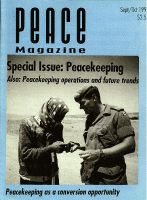
Peace Magazine Sep-Oct 1993, page 23. Some rights reserved.
Search for other articles by Mohamed Urdoh here
There is something inherently disturbing about the ongoing U.N. intervention in Somalia. Both the spirit and the style of UNOSOM II (United Nations Operation in Somalia II) calls into question whether the international body is an institution that treats all human beings equally.
Little less than five decades back, the U.N. was launched to "save succeeding generations the scourge of war." But after the massive air and land attacks in the largest urban center of this east African country, one wonders if the world body hasn't turned into a tool for fulfilling an inhuman, racist agenda.
The U.N. propaganda machine has been distorting the Somali situation to justify American violence in a country which, heaven knows, needs everything else but additional bloodshed. It is noteworthy that the UNOSOM II operations were launched under the pretext of restoring law and order to the trouble-torn nation. Of course, many well-meaning people who are not familiar with the inefficiency of the U.N. initially bought the idea.
On a closer look, though, the initiated eye could see that the foregoing wild claim was a lie concocted by U.S./U.N. bureaucrats living it up in Djibouti, Nairobi, New York, and Washington. To illustrate the point, go back to the experiences of Eritrea and Namibia, two former U.N. trusteeships. Both of them had sunk deep into periods of prolonged bloodshed before becoming independent from Ethiopia and South Africa respectively.
A former Italian colony prior to the Second World War, Eritrea was forcibly annexed to Ethiopia by the U.N. despite stiff resistance by its people. The U.N. had buckled under strong pressure by the U.S., who was bidding for a naval base in the Red Sea and Eritrea was the price to be paid to Addis Ababa. Meanwhile, although apartheid had taken root in South Africa as early as 1948, the racist state received Namibia on a silver platter from the U.N. at about the same time.
Somalia (an ex-Italian colony like Eritriea) is yet another example indicating the inability of the U.N. to guarantee a bright future to a nation-any nation. After the war, Italy was appointed to run the area as a U.N. trust territory for ten years before it would become independent. In the course of that period, the Italian administration laid the foundation for a corrupt political, military, and bureaucratic elite. And, only 30 years after winning its hollow independence and uniting with the former British Somaliland (now the Republic of Somaliland), the ex-Italian colony (which comprises southern and north-eastern Somalia) split at the seams. In line with this historical trend, the ongoing U.N. involvement in Somalia backfired and the recipe for the current failure is by no means different than that which stalled the world body's similar activities in the past. The ingredients include kowtowing to a big power, enforcing unrealistic solutions for complex issues, and ignoring the wishes of peoples whose interests are at stake.
In the case of the present-day Somalia, there is yet another element in the picture. The U.N. has taken sides in the Somali civil war and even tried to impose a leadership of its choice on the people there. Such an attempt was made during four so-called national reconciliation conferences held between 1991 and 1993 in Djibouti and Addis Ababa. The Djibouti meetings were organized by the government of this tiny state under the instructions of Egypt, Saudi Arabia, and Italy. Seeing Somalia as its backyard, each of these countries wanted to control the area. This fact notwithstanding, these countries enjoyed the blessing of the U.N. and the United States. Therefore, the main consideration in those conferences was not the interests of the Somali people, but rather those of the foreign meddlers.
The remaining two conferences, which were sponsored and steered by the U.N. in Addis Ababa, were not significantly different, since the U.N. was little more than a front for Washington. The nature of Addis Ababa and Djibouti conferences became clear as early as 1992. It was then that Djibouti Conference II had endorsed the leadership of self-appointed president, Ali Mahdi Mohamed and his infamous Manifesto group. This group was cobbled together by Italy with the blessing of Egypt and Saudi Arabia, who wanted to block the way to the USC-wing of General Aideed, whose forces liberated Mogadishu. The U.N. and the U.S. made a gross mistake by employing the same tactics as the above-mentioned countries in order to achieve similar results.
Against this backdrop, the intervention of Egypt, Italy, Saudi Arabia, the U.N. and the U.S. only enhanced the hostilities against these countries and the U.N. on the part of the Somali who already resented the foregoing countries because of their past support to the dictator, Barre, and for trying to bring him back to power after his downfall. A former Egyptian minister of state for foreign affairs, U.N. Secretary- General Boutros Boutros-Ghali was one of the main architects of his country's pro-Barre policies. Hence, the Somali people became alienated from the U.N. as soon as he took office.
But their estrangement was not total until Boutros-Ghali started dancing to Washington's tune. His responsiveness to the wishes of the United States is not surprising; he had loyally served three different Egyptian dictatorships before the U.S. put him on the hot seat of power at the U.N. after Washington's first choice, Brian Mulroney, failed to get the post.
Mohammed Urdoh is a Somali journalist living in Canada.

Peace Magazine Sep-Oct 1993, page 23. Some rights reserved.
Search for other articles by Mohamed Urdoh here